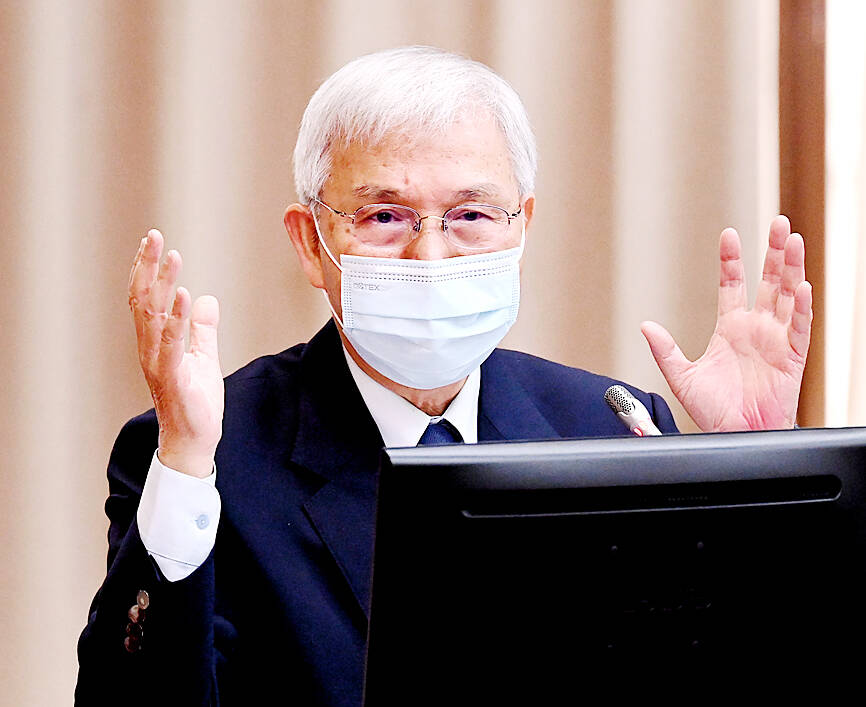The central bank would cautiously deal with the inflation issue next week in a quarterly policymaking meeting, as expected electricity rate hikes are feeding inflation fears, bank Governor Yang Chin-long (楊金龍) said yesterday.
“The board of directors will approach the issue very carefully when they meet and review policy rates on Thursday next week,” Yang told a meeting of the legislature’s Finance Committee in Taipei.
If the inflationary gauge persistently stays above the 2 percent alert, the era of low interest rates might be over, Yang said, adding that consumer price index (CPI) growth used to hover at about 1 percent, but it has exceeded 2 percent in the past few years.

Photo: Chu Pei-hsiung, Taipei Times
The CPI grew 2.95 percent in 2022 and 2.49 percent last year.
The nation’s top monetary policymaker in December last year forecast a 1.89 percent CPI increase this year before the government made known plans to raise electricity rates.
The governor said that inflation expectations might increase consumer price movements, which is unfavorable for the fight against inflation.
Electricity fee hikes are expected next month.
It is too early to pass judgement on the matter as the Ministry of Economic Affairs would arrive at its conclusions after sizing up the Cabinet’s subsidy for debt-ridden Taiwan Power Co (台電), Yang said.
The rate hikes would be less drastic if the subsidy reaches NT$150 billion (US$4.76 billion), he said.
Yang refused to comment on whether the central bank would renew monetary tightening if the CPI fails to return to the 2 percent mark this year.
If the price trend persists, future interest rates would not be as low as before the tightening in 2022, he said.
The matter warrants care and caution, Yang added.
What concerns the central bank is the domino effect, or sweeping price hikes by retailers and wholesale operators to pass extra financial burdens to customers and end-users, Yang said.
However, the central bank does not need to follow the steps of the US Federal Reserve or the European Central Bank, which have contemplated rate cuts to prevent economic hard landings, he said.
Taiwan’s policy rate remains relatively moderate at 1.875 percent, he added.
Separately, Yang urged local investors to be alert to possible risks, as they eagerly seek to participate in the fundraising campaigns launched by several securities firms to sell high-dividend exchange-traded funds (ETFs).
The enthusiasm for ETFs was a “herd behavior,” a term used to describe a trend of people rushing to follow the actions of others, he said.
Meanwhile, the central bank would keep a close eye on the housing market, as loans for the property industry continue to grow, Yang said.
The bank would review its selective credit control policy, he said.
The central bank has introduced several rounds of selective credit controls on local banks since December 2020 to cool down the property market and rein in rising housing prices.
Additional reporting by CNA

Intel Corp chief executive officer Lip-Bu Tan (陳立武) is expected to meet with Taiwanese suppliers next month in conjunction with the opening of the Computex Taipei trade show, supply chain sources said on Monday. The visit, the first for Tan to Taiwan since assuming his new post last month, would be aimed at enhancing Intel’s ties with suppliers in Taiwan as he attempts to help turn around the struggling US chipmaker, the sources said. Tan is to hold a banquet to celebrate Intel’s 40-year presence in Taiwan before Computex opens on May 20 and invite dozens of Taiwanese suppliers to exchange views

Application-specific integrated circuit designer Faraday Technology Corp (智原) yesterday said that although revenue this quarter would decline 30 percent from last quarter, it retained its full-year forecast of revenue growth of 100 percent. The company attributed the quarterly drop to a slowdown in customers’ production of chips using Faraday’s advanced packaging technology. The company is still confident about its revenue growth this year, given its strong “design-win” — or the projects it won to help customers design their chips, Faraday president Steve Wang (王國雍) told an online earnings conference. “The design-win this year is better than we expected. We believe we will win

Chizuko Kimura has become the first female sushi chef in the world to win a Michelin star, fulfilling a promise she made to her dying husband to continue his legacy. The 54-year-old Japanese chef regained the Michelin star her late husband, Shunei Kimura, won three years ago for their Sushi Shunei restaurant in Paris. For Shunei Kimura, the star was a dream come true. However, the joy was short-lived. He died from cancer just three months later in June 2022. He was 65. The following year, the restaurant in the heart of Montmartre lost its star rating. Chizuko Kimura insisted that the new star is still down

While China’s leaders use their economic and political might to fight US President Donald Trump’s trade war “to the end,” its army of social media soldiers are embarking on a more humorous campaign online. Trump’s tariff blitz has seen Washington and Beijing impose eye-watering duties on imports from the other, fanning a standoff between the economic superpowers that has sparked global recession fears and sent markets into a tailspin. Trump says his policy is a response to years of being “ripped off” by other countries and aims to bring manufacturing to the US, forcing companies to employ US workers. However, China’s online warriors